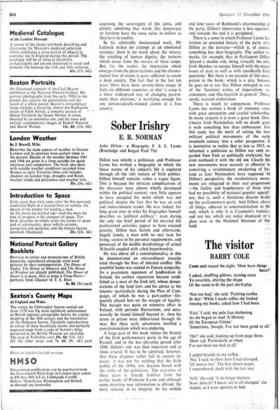Sober Irishry
E. R. NORMAN
John Dillon : a Biography F. S. L. Lyons (Routledge and Kegan Paul 75s) Dillon was strictly a politician, and Professor Lyons has written a biography in which the linear nature of his subject's life is explored through all the dal texture of Irish politics. Dillon himself remains rather a vague figure. This is because the intricate complications of his character were almost wholly developed within the political context; very little appears- to have occupied his mind which was not political, despite the fact that he was an avid and indiscriminate reader. He was, indeed, for long given over to what his biographer himself describes as 'political celibacy': even during the only too' brief period of his married life professional activities appear to have enjoyed priority. Dillon was, before and afterwards, hugely lonely, a man with no real taste for living, austere in his personal requirements, and possessed of the double disadvantage of actual ill-health coupled with rabid hypochondria.
He was above all a constitutionalist; in this he demonstrated an extraordinary tenacity tried through the fires of internal conflict. His youthful home was soaked in Fenian. sympathy. As a passionate opponent of landlordism in Ireland, his earliest reputation became estab- lished as a man of the Irish left, whose denun- ciations of the land laws and his advice to the tenants—particularly during the Plan of Cam- paign, of which he was a part-author—fre- quently placed him on the margin of legality. This margin was quite an extensive affair in Ireland, with periodic fluctuations, and occa- sionally he found himself beyond it: then his terms in prison were abbreviated through ill- ness. But these early adventures instilled a constitutionalism which was enduring.
A large part of this book relates the history of the Irish parliamentary party in the age of Parnell, and in the less elevating period after 1890. Dillon's role was then important and at times crucial. It has to be admitted, however, that these chapters rather fail to sustain in- terest: it was not for nothing that the Irish public of the 1890s, too, became bored with the strife of the politicians. The narrative of these years is already familiar from the earlier works of Professor Lyons and although some diverting new information is offered, the story remains in its integrity. In the middle
and later years of Redmond's chairmanship of the party, Dillon's importance is less:apparent, and towards the end it is peripheral.
There is a sense in which Professor Lyons has written an extended history of the party with Dillon as the narrator—which is, of course, something less than biography. The author re- marks, for example, that in Parliament Dillon 'played a double role, being virtually the only Irish Member to occupy himself with the major issues of state as well as with specifically Irish questions.' But there is no account of this occu- pation in the book; which is a pity, because he goes on to say that Dillon emerged as one of the 'foremost critics of imperialism, re- armament, and Machtpolitik in general.' These, surely, warrant elaboration.
There is much to compensate. Professor Lyons has written a book of immense value with great perception and careful scholarship. In many respects it is even a great book. Doc- trinaire Irish Nationalists will no doubt greet it with something less than enthusiasm. 'For this study has the merit of setting the new militant political movements of the. early twentieth century into a sober perspective. It is instructive to realise that as late as 1915, so informed a politician as Dillon not only, re- garded Sinn Fein as politically irrelevant, but even confused it with the old IRB. Clearly the new movements were scarcely as effective' in contriving a revolutionary awakening of Ire- land as later Nationalists have supposed. In Dillon's perspective, the revolutionary move- ments are relegated to their real proportions -'--the futility and hopelessness of those who had no possibility of national popular appeal : not, that is, until a fortuitous disaster broke' up the parliamentary party. And Dillon, above' all things, adhered to constitutionalism to Ole end; which is why it is Casement's treniqrs, and not his, which are today displayed ilea' lass case at the National Museum of Irte,I land.














































 Previous page
Previous page